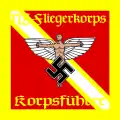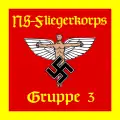National Socialist Flyers Corps
The National Socialist Flyers Corps (German: Nationalsozialistisches Fliegerkorps; NSFK) was a paramilitary organization of the Nazi Party.
| Nationalsozialistisches Fliegerkorps - NSFK | |
 NSFK pennant | |
| Agency overview | |
|---|---|
| Formed | 15 April 1937 |
| Preceding agency | |
| Dissolved | 8 May 1945 |
| Jurisdiction | Occupied Europe |
| Agency executives |
|
| Part of a series on |
| Nazism |
|---|
|
History
NSFK was founded 15 April 1937 as a successor to the German Air Sports Association; the latter had been active during the years when a German air force was forbidden by the Treaty of Versailles. The NSFK organization was based closely on the para-military organization of the Sturmabteilung (SA). A similar group was the National Socialist Motor Corps (NSKK). During the early years of its existence, the NSFK conducted military aviation training in gliders and private airplanes.
Leadership
Friedrich Christiansen, originally a Generalleutnant then later a Luftwaffe General der Flieger, was NSFK Korpsführer from 15 April 1937 until 26 June 1943, followed by Generaloberst Alfred Keller until 8 May 1945.
Ranks, uniforms and other insignia
The paramilitary rank system in use by the NSFK between the years of 1933 and 1945. The ranks were designed after paramilitary rank titles of the Sturmabteilung. Most ranks of the NSFK were also used by the National Socialist Motor Corps which maintained its own paramilitary rank system.
As with most Nazi paramilitary groups, rank patches were worn on a single collar opposite a badge of unit membership. The exception was for the ranks Standartenführer and above which displayed rank insignia on both collars.
Rank insignia
As of 1934, the final rank pattern of the National Socialist Flyer Corps was as follows:[1][2][3]
| Insignia | NSFK Rank | Translation | Luftwaffe equivalent | |
|---|---|---|---|---|
| Collar | Shoulder | |||
| Korpsführer | Corps Leader | Generalfeldmarschall | ||
| Ehrenführer | Honorary Leader | Generaloberst | ||
| Obergruppenführer | Senior Group Leader | General | ||
| Gruppenführer | Group Leader | Generalleutnant | ||
| Brigadeführer | Brigade Leader | Generalmajor | ||
| Oberführer | Senior Leader | Oberst | ||
| Standartenführer | Regiment Leader | Oberst | ||
| Obersturmbannführer | Senior Assault Unit Leader | Oberstleutnant | ||
| Sturmbannführer | Assault Unit Leader | Major | ||
| Hauptsturmführer | Chief Assault Leader | Hauptmann | ||
| Obersturmführer | Senior Assault Leader | Oberleutnant | ||
| Untersturmführer | Junior Assault Leader | Leutnant | ||
 |
Obertruppführer | Senior Troop Leader | Stabsfeldwebel | |
 |
Truppführer | Troop Leader | Hauptfeldwebel | |
 |
Oberscharführer | Senior Squad Leader | Oberfeldwebel | |
 |
Scharführer | Squad Leader | Unteroffizier | |
 |
Rottenführer | Section Leader | Obergefreiter | |
 |
Sturmmann | Storm Trooper | Gefreiter | |
 |
Mann | Trooper | Flieger | |
| None | Anwärter | Candidate | None | |
Rank flags
 NSFK Korpsführer
NSFK Korpsführer NSFK Stabsführer
NSFK Stabsführer NSFK Gruppenführer
NSFK Gruppenführer NSFK Standartenführer
NSFK Standartenführer NSFK Sturmangehörige
NSFK Sturmangehörige NSFK Sturmführer
NSFK Sturmführer NSFK Standarte
NSFK Standarte NSFK Vehicle pennant
NSFK Vehicle pennant NSFK White vehicle pennant
NSFK White vehicle pennant NSFK Blue vehicle pennant
NSFK Blue vehicle pennant
Source:[5]
NSFK badges
- The Free Balloon Pilot Badge (Das Abzeichen für Freiballonführer). This was authorized on 10 March 1938 by NSFK Korpsführer, Christiansen.[6]
- The Motor Aircraft Pilot Badge (Das Abzeichen für Motorflugzeugführer). This was authorized on 12 July 1938 by Christiansen.[6]
- The Large Glider Flyer Badge (Das Große Segelfliegerabzeichen). This was authorized on 26 January 1942 by Christiansen.[6]
References
- "Uniform und Rangabzeichen des NSFK" (in German). Retrieved 26 November 2018.
- Ley, Robert (1937). "Table 73". Organisationsbuch der NSDAP (in German). Zentralverlag.
- "Nationalsozialistisches Fliegerkorps (NSFK) Regulation Collar Tabs". German Daggers. 2013. Retrieved 5 April 2019.
- Ley, Robert (1943). Organisationsbuch der NSDAP. Zentralverlag der NSDAP, images 70-73.
- Herzfeld, Andreas (2013). Die Riemann'sche Sammlung deutscher Autoflaggen und Kfz-Stander, vol. 1. p. 170, and image 71.
- Doehle 1995, p. 122.
Further reading
- Doehle, Heinrich (1995) [1943]. Medals & Decorations of the Third Reich: Badges, Decorations, Insignia. Reddick Enterprises. ISBN 0962488348.



_etc._Public_domain_CROPPED.jpg.webp)